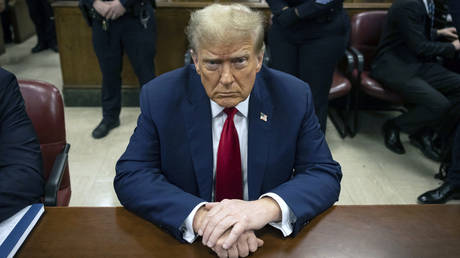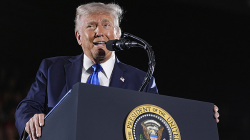Trump's Warning of Dollar Action Against BRICS Indicates the US Hasn't Learned Anything
The article discusses President-elect Trump's blunt effort to deter de-dollarization, which is rooted in a misguided belief in Washington's dominance.. source:TROIB RTS

Donald Trump still possesses that old magic: renowned for utilizing social media to profound effect, for better or worse, the former and incoming US president has stirred the pot once again. This time, his focus was on BRICS+, a coalition of primarily non-Western states that have begun to organize and collaborate outside of Western influence and without Washington’s consent.
Specifically, Trump has warned that any move to “move away from the Dollar” will incur severe US repercussions, including “100% tariffs.”
“There is no chance that the BRICS will replace the U.S. Dollar in international trade,” Trump asserts, maintaining that any nation daring to challenge “the mighty US Dollar” – captured in his signature over-capitalized Trumpese – “should wave goodbye to America.” He insists that countries wishing to maintain good relations with the US must not only refrain from abandoning the dollar but also promise not to even consider doing so.
It’s worth noting the obvious: who wouldn’t want to wave the US goodbye if they could? And for something that Trump claims has “no chance” of occurring, he seems particularly agitated about the prospect of dollar replacement or abandonment. What fuels this anxiety?
One part of the answer lies in psychology. As America grapples with its decline, its late-imperial elites, regardless of party affiliation, are likely to be hypersensitive to any signs of defiance. They continue to cling to the delusion of being “indispensable” and expect nearly 8 billion people outside the US to accept their “leadership.”
However, this explanation only scratches the surface. What sets BRICS apart is not just its objectives but its actual success as a geopolitical challenge. Emerging less than two decades ago, BRICS has doubled in size within the past year, with further expansion likely. Though it is a complex and evolving organization, a key concern has been the increasing US misuse of the dollar as a geopolitical instrument. Thus, BRICS has served as a platform for initiatives around “de-dollarization.” Indeed, Bloomberg reports that BRICS members have been “leading the global debate over dollar exposure.”
This escalating discourse has provoked Trump, and this is not the first time. Months before his recent election victory, Bloomberg noted his and his advisers’ concerns and threats regarding de-dollarization. The anxiety is understandable. The “exorbitant privilege” that the dollar enjoys globally, a term coined by a former French finance minister, has allowed the US to indulge in irresponsible levels of debt. Presently, nearly 60% of all central bank reserves worldwide are in dollars, while approximately 90% of foreign-exchange transactions utilize this currency.
Consequently, Washington has wielded what The Economist recently characterized as “an enormous lever of power,” surveilling and controlling global financial transactions and imposing near-confiscation measures, as seen with almost $300 billion of Russia’s national reserves. In essence, the dollar enables the US to live beyond its means at the expense of other nations, leveraging financial coercion akin to blackmail or robbery.
What distinguishes this moment is Trump’s exaggerated rhetoric and his open targeting of BRICS.
His threat is directed at a coalition comprising two global powers, Russia and China, alongside significant regional players like Iran and Brazil. This group represents at least 45% of the world’s population, and in terms of economic power, BRICS has already eclipsed the G7, the waning assembly of Western countries. As geopolitical analyst Kishore Mahbubani notes, the G7’s share of global GDP has plummeted from 66% at the Cold War’s end, when BRICS members did not exist, to just 45% today—compared to BRICS+, which now accounts for 24%. When adjusted for purchasing power, BRICS+ economies have surpassed the G7, holding 34% of global GDP against the G7’s 29%.
Trump’s statements thus appear to signal an eagerness for conflict with two major powers—one currently defeating the West in Ukraine—and a coalition representing nearly half the world's populace and growing strength. What is the true implication of Trump’s threats in this context?
It is evident that the president-elect’s outburst reflects a tradition of breathtakingly arrogant overreach in US diplomacy. For a sovereign state to threaten others over their currency choices, especially in their own transactions, is ludicrous. Demanding that these nations not even attempt to reconsider their financial sovereignty presents a bizarre mix of intimidation and absurdity.
However, this should not be solely blamed on Trump. This mindset embodies a broader political culture—a belief that the “exceptional” US can meddle in the affairs of other nations without consequence. Incidents like “secondary sanctions,” which disrupt foreign commercial relations, and the persecution of Australian journalist Julian Assange highlight this arrogance.
It is no coincidence that Trump perceives himself as distinct from the establishment; however, he is entangled in the same damaging hubris. Does his demand possess any foundation? Not at all, for three specific reasons.
Firstly, Trump appears to misjudged the strategic sophistication surrounding the BRICS discussions on de-dollarization. Their goal is not to propose a new global currency comparable to the dollar or euro. In fact, President Putin has pointedly critiqued the euro as an example of what not to emulate. Rather, Russia seeks to establish an international payments system that leverages modern digital technology, a vision shared by China. Any outcomes from these initiatives will be intricate and unlikely to fall victim to the clumsy intimidation Trump attempts.
Secondly, Trump’s threats are inherently self-defeating. The “100% tariffs” he brandishes are implausible unless he intends to inflict significant damage on the American economy and consumers. His prior tariff threats against China, Canada, Mexico, and the EU—combined with his unrealistic tax cut promises—risk driving up prices and accelerating inflation in the US, which adversely affected the Democrats in prior elections.
Finally, Trump’s rhetoric may incentivize further moves toward de-dollarization, as recognized by some Western analysts. His blatant displays of economic coercion and disrespect for other nations' financial sovereignty may reinforce the backlash—a concern echoed by Dmitry Peskov, a spokesman for the Russian presidency.
However, to be fair to Trump, his threats can be seen as a misdirected attempt to mitigate the considerable fallout from previous US economic warfare strategies enacted by administrations both Democratic and Republican.
Much of this damage arose from Washington’s increasingly aggressive stance against Russia. Prior to leaving office in 2017, Obama had significantly escalated sanctions against Russia. Although Trump maintained a slower pace of implementing new sanctions, he still contributed to the ongoing punitive measures, in part due to congressional restrictions from the Countering America’s Adversaries Through Sanctions Act.
During Biden's administration, sanctions intensified dramatically, particularly following the escalation in 2022, with Biden touting “the toughest ever imposed on a major economy.” By early 2024, combined sanctions imposed by the US and its allies totaled 16,500—all aimed at crippling Russia's economy.
This unprecedented economic assault has ultimately backfired, creating unintended benefits for Western speculators and contributing to inflation that negatively impacted the Democratic party during recent elections. The struggles faced by poorer nations were exacerbated as well, along with major economies, particularly in EU-NATO Europe, where leadership has sidelined domestic interests in favor of confrontational policies against Russia.
Faced with this turmoil, it can be argued that Trump is desperately trying to restrain the trend toward de-dollarization. Ironically, he is doing so through the very heavy-handedness that led to this predicament initially. Instead of adopting a needed pivot toward cooperation by lifting sanctions and ceasing economic aggression, he resorts to issuing more crude threats.
In the end, Trump seems to persistently share the same misguided perception as much of the current US elite: a belief in the limitless power of American influence, overshadowed by the realities posed by other nations. While he acknowledges the possibility of American error—allowing him to claim he can correct such missteps—he fails to recognize that restoring America’s standing in the world requires genuine collaboration with other countries, not more bullying.
Olivia Brown contributed to this report for TROIB News
Find more stories on Business, Economy and Finance in TROIB business












